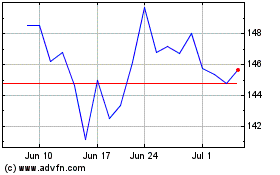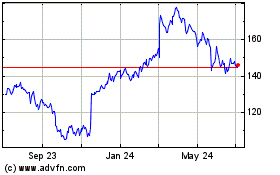Today's Top Supply Chain and Logistics News From WSJ
March 01 2017 - 6:58AM
Dow Jones News
By Paul Page
Sign up:With one click, get this newsletter delivered to your
inbox.
Target Corp.'s chief is standing by the retailer's physical
stores even as the brick and mortar seems to be crumbling around
him. Chief Executive Brian Cornell warned of a steep decline in
profit this year, the WSJ's Khadeeja Safdar reports, while calling
this "a year of investment" that will commit Target to improving
its stores, launching exclusive brands and developing supply chain
and digital capabilities. The grim outlook following declining
sales in the holiday quarter is a stark sign of the impact internet
commerce is having on traditional retailers, and Target's faltering
approach shows how tough it's been to turn around the big-box
operators. Target isn't closing stores like some retailers, but
instead plans to use more of those outlets to fulfill online orders
while it cuts its overall inventory. As other retailers have seen,
however, using stores for both online and in-store fulfillment can
bring a new set of costs, and headaches.
LG Electronics Inc. says the need to move goods faster to
American consumers is behind the South Korean company's decision to
build its first major factory in the U.S. The conglomerate is
putting a washing machine plant in central Tennessee, the WSJ's
Andrew Tangel reports, in a move that could help LG's push into the
American home-appliance market. It also gives LG a new production
outlet following a U.S. Commerce Department decision last year to
impose tariffs on LG washers made in China. But LG insists its new
site is built on the need to streamline its supply chain in a
lucrative market, not battles over tariffs. LG executive William
Cho says a U.S. factory will speed up deliveries to American
customers, reduce shipping time and costs while helping the company
to respond more quickly to market demands.
Flatbed trucking company Daseke Inc. has some new currency for
its acquisition-fed growth strategy. The company has started
trading on Nasdaq, WSJ Logistics Report's Erica E. Phillips writes,
through a merger with an investment company set up for the deal
that values the company at about $700 million. Daseke is one of the
biggest carriers in the $133 billion flatbed sector, but it's a
highly-fragmented wing of trucking the company believes is ripe for
consolidation. Daseke says it will use $150 million from the new
stock offering for more acquisitions to build on a buying spree
that took it from $30 million in revenue in 2009 to $655 million
last year. Daseke has targets in mind, but its bigger aim may be
the $1 trillion in infrastructure spending being considered in
Washington. With its bigger scale, Daseke may be heading into a
fast lane for a share of that federal money.
SUPPLY CHAIN STRATEGIES
Big warehouses are going up at a blistering pace, but companies
aren't lining up quite as fast to fill them. A new report from
real-estate broker Colliers International shows developers finished
"big box" warehouses totaling nearly 25.5 million square feet
combined in the last three months of 2016, a 77% increase from a
year ago. But "net absorption" -- the industry measure for real
estate filled by clients -- slipped back from a year ago and from
the third quarter. It's only one quarter, of course, and a
typically slow time of year. But it signals a rare pause in a
warehousing market that has seen developers scrambling to keep up
with accelerating growth in demand in recent years. Market-watchers
at Colliers and other firms say demand for distribution centers
remains vibrant, and they note the online sales explosion that is
fueling the warehousing surge isn't slowing down at all.
Add the seafood business to the industries lining up against a
possible border tax. Food businesses that rely on raw materials are
among those most exposed to the border-adjustment provision tin the
House Republicans' tax plan, the WSJ's Richard Rubin and Heather
Haddon report. And unlike goods manufacturers, they can't turn
their supply chains inside out. They warn that the potential border
adjustment tax could force them to raise prices and likely would
take a big toll on revenues. The food industry depends heavily on
imports: Imported seafood, for instance, makes up more than 80% of
domestic consumption. Coffee, tea, spices, chocolate and bananas
make up some of the world's longest-standing supply chains -- and
can't be produced in commercially viable quantities at home.
Border-tax proponents are pressing ahead, but the potential impact
at the dinner table suggests the effort will be a complicated
battle that will reach deep into the business community.
QUOTABLE
IN OTHER NEWS
German container line Hapag-Lloyd AG's full-year operating
profit fell in 2016 but rose in the final quarter on cost-cutting.
(WSJ)
A revised fourth-quarter gross domestic product report showed
consumer spending grew faster than earlier estimated while business
investment was softer. (WSJ)
U.S. home prices jumped in December to their fastest full-year
growth since 2013. (WSJ)
U.S. imports of consumer goods jumped 4.8% in January.
(MarketWatch)
Automotive supplier Takata Corp. pleaded guilty to criminal
wrongdoing and will pay $1 billion for providing misleading reports
to auto makers on rupture-prone air bags. (WSJ)
Airbus SE completed the sale of a majority stake in its defense
electronics business to private-equity firm KKR & Co. (WSJ)
Apparel giant VF Corp says it is adopting new sourcing policies
to eliminate products that contribute to deforestation and human
rights violations. (Reuters)
Nissan Motor Co. wants the U.K. government to help rebuild the
country's car parts business to replace components after the
country leaves the European Union. (The Guardian)
Gap Inc. is reconfiguring some distribution centers that supply
retail stores to deliver online orders. (Internet Retailer)
ANA Holdings and its affiliated Overseas Courier Service will
set up a Chinese-language online marketplace for Japanese companies
to sell goods in China. (Nikkei Asian Review)
Shipping company DHT Holdings rejected a sweetened takeover
offer from Norway's Frontline. (Seatrade Maritime)
CMA CGM SA Chief Executive Rodolphe Saadé says the container
shipping giant is watching out for takeover targets in the
consolidating industry. (Lloyd's List)
Korean shipping line Hyundai Merchant Marine Co. signed a pact
with two regional operators to cooperate on container shipments.
(Yonhap)
Lesco Logistics, part of a family-owned group of Tennessee
trucking businesses, will wind down operations. (Chattanooga Times
Free Press)
Retail e-commerce sales in Germany grew 12.5% last year.
(eMarketer)
ABOUT US
Paul Page is deputy editor of WSJ Logistics Report. Follow him
at @PaulPage, and follow the entire WSJ Logistics Report team:
@brianjbaskin, @jensmithWSJ and @EEPhillips_WSJ and follow the WSJ
Logistics Report on Twitter at @WSJLogistics.
Subscribe to this email newsletter by clicking here:
http://on.wsj.com/Logisticsnewsletter .
Write to Paul Page at paul.page@wsj.com
(END) Dow Jones Newswires
March 01, 2017 06:43 ET (11:43 GMT)
Copyright (c) 2017 Dow Jones & Company, Inc.
Target (NYSE:TGT)
Historical Stock Chart
From Mar 2024 to Apr 2024

Target (NYSE:TGT)
Historical Stock Chart
From Apr 2023 to Apr 2024
